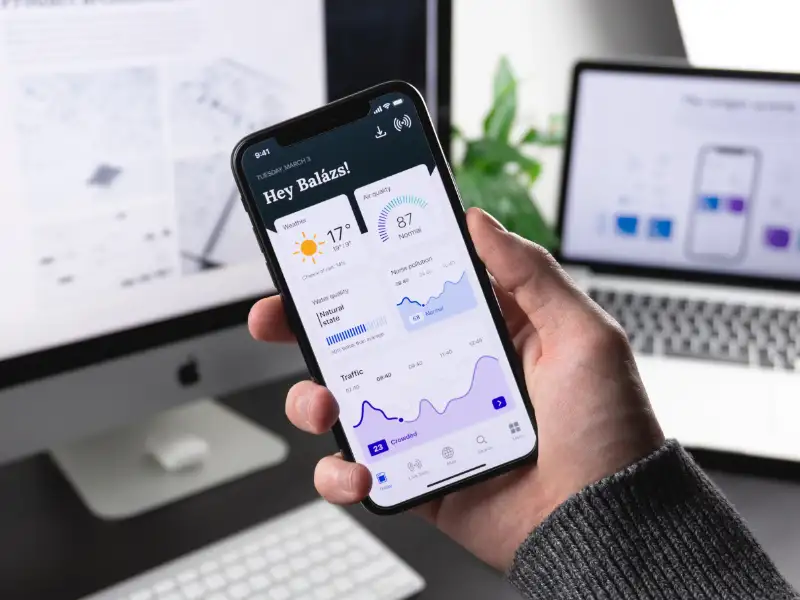Top 10 Tips for Building Your First Mobile App
Updated on May 10, 2023 by Tim Donahue
Before you begin building your first mobile app – for those who’ve never done it before
For people who’ve never built a mobile application (an “app”) there is certainly a lot to learn. But it can be done!

Photo by Balázs Kétyi-Unsplash
Below are a couple of excellent lists of things to watch out for and what to know – the Top 10 Tips for Building Your First Mobile App list – and also the actual steps a person will need to take in order to build their first mobile app.
Top 10 Tips for Building Your First Mobile App
- Don’t underestimate the time and effort required: App development can be a complex and time-consuming process, especially for beginners. Be prepared to invest a significant amount of time and effort to learn the necessary skills and overcome challenges.
- Avoid feature creep: First-time developers often try to add too many features to their app, making it overly complicated. Focus on the core functionality and resist the urge to include unnecessary features that can derail your project or confuse users.
- Learning programming languages can be challenging: Be patient and persistent when learning new programming languages, as it may take time to become proficient. Start with online tutorials and resources, and consider joining a community or taking a course for additional support.
- Choosing the right tools and frameworks is crucial: With numerous development tools and frameworks available, selecting the right one for your project can be overwhelming. Research your options and choose a tool that aligns with your skills and project requirements.
- Don’t overlook app design: A visually appealing and user-friendly design is critical for app success. As a beginner, you may struggle with design aspects, but take the time to learn basic design principles and use prototyping tools to refine your app’s UI/UX.
- Testing is more important than you might think: First-time developers often underestimate the importance of thorough testing. Allocate sufficient time for testing and debugging, and consider using beta testers to identify issues you might have missed.
- Be prepared for platform-specific challenges: Developing for iOS and Android platforms can present unique challenges. Familiarize yourself with each platform’s guidelines and requirements, and be prepared to adapt your app to accommodate platform-specific features and constraints.
- App store approval isn’t guaranteed: Both Apple and Google have strict guidelines for app submissions, and getting your app approved can be a challenging process. Carefully review the guidelines and ensure your app complies with them to increase your chances of approval.
- Marketing your app is essential: With millions of apps in the app stores, standing out from the crowd is a major challenge. Develop a marketing strategy to promote your app and generate interest, even if you have no prior experience in marketing.
- Stay resilient and adaptable: Building your first app is a learning experience, and you will inevitably encounter setbacks and challenges. Stay resilient, adapt to new situations, and view each challenge as an opportunity to learn and grow as a developer.
Here are the steps that will be required to build your app:
- Define your app’s goal: Clearly outline the purpose and functionality of your app. Determine what problem it will solve or what value it will add to the users.
- Research your target audience and competition: Understand the needs and preferences of your target audience, and analyze the competition to identify gaps and opportunities.
- Choose a platform: Decide whether to build your app for iOS, Android, or both. This decision will depend on your target audience and available resources. Building for both platforms simultaneously may require more resources and time.
- Start with a simple design: As a beginner, focus on creating a clean and straightforward user interface (UI) that is easy to navigate. Prioritize essential features and avoid overloading the app with unnecessary functionality.
- Learn the necessary programming languages: Familiarize yourself with programming languages like Swift for iOS development or Java/Kotlin for Android development, depending on your chosen platform.
- Utilize app development tools and frameworks: Take advantage of tools and frameworks like React Native, Xamarin, or Flutter, which can simplify the development process and help you create cross-platform apps more efficiently.
- Test your app extensively: Conduct thorough testing to identify and fix bugs, ensure optimal performance, and provide a seamless user experience. Ask friends, family, or beta testers for feedback to improve the app further.
- Plan your app’s launch: Develop a marketing strategy to create awareness and interest in your app before it’s released. Consider using social media, press releases, and promotional content to generate buzz.
- Monitor user feedback and analytics: After launching your app, pay close attention to user feedback and analytics data to identify areas that need improvement, and update your app accordingly.
- Stay committed to learning: Building your first app is a learning process. Be prepared to encounter challenges and setbacks, but remain persistent and open to learning from your mistakes to grow as a developer.

Published by:
Tim Donahue
StartABusiness.Center
Updated on May 10, 2023
Tim Donahue
StartABusiness.Center
Updated on May 10, 2023